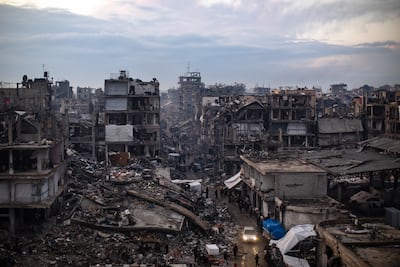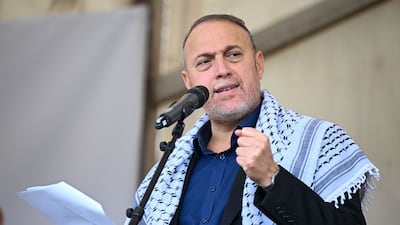The Palestinian ambassador to the UK sees the Gaza ceasefire being undermined to the point of failure, not least because of the statements emanating from the White House.
Husam Zomlot has told The National that he worries about what could come next, conscious that Palestinians in Gaza have barely begun to retrieve the remains of their loved ones from the rubble since the current, fragile truce began on January 19.
“Every day we're hearing new ideas that might undermine the idea of implementing the ceasefire,” he said from his office in the Palestinian mission in London.
Mr Zomlot was previously Palestinian envoy to the US and was expelled during the first Trump administration. He was speaking shortly after Mr Trump said Palestinians should leave Gaza, with no right of return, so the land could be taken over and rebuilt by the US.
Mr Zomlot sees a gap between Mr Trump's presidential goals and his rhetoric. “He wants to be the peacemaker and he wants to be the unifier?” he asked.

“We’re hoping that what President Trump promised at the beginning of his second term will be what motivates him − and the rest of the world's peace-making and unifying forces − rather than encouraging other wars."
During his US presidential campaign and before his inauguration late last month, Mr Trump demanded that a way was found for a ceasefire to be negotiated in Gaza. He has since said “all hell” will break loose if Hamas does not release those people it is still holding captive in the enclave, before a deadline of Saturday.
It was “unfortunate”, therefore, that Mr Trump chose to meet Israeli Prime Minister Benjamin Netanyahu before other allies in the region. “He only heard from that one-sided ideologue,” Mr Zomlot said.
What animates Mr Zomlot most is Mr Trump’s comparison of the Israeli hostages released by Hamas last week to Holocaust survivors. That the hostages were emaciated was a result of the large-scale siege imposed on Gaza during the course of the war, he added.
“Our people in Gaza are still being found, their decomposed corpses all around Gaza are being eaten by wild animals,” Mr Zomlot said. “Yet we only pick on three Israeli captives who have lost some weight because of an Israeli-imposed starvation? This tells you all you need to know about the level of dehumanisation of the Palestinian people.”
He believes Mr Trump’s framing of the agreement as a hostage exchange overlooked its more urgent purpose – ending Israel’s military assault on Gaza. Mr Zomlot says this amounts to genocide.
West Bank focus
Rather, Mr Trump’s rhetoric on resettling the Palestinians in Arab countries was an “outlandish” and “unimplementable” idea – but Mr Zomlot warned it may be a smokescreen to mask more tangible objectives.

With a ceasefire in place in Gaza, the war has shifted to the cities of Jenin and Tulkarm in the occupied West Bank, where more than 40,000 Palestinians have been displaced and about 600 detained.
“There is the tactical side of diverting our attention from the real stuff that is happening on the ground," the envoy said. "They want everybody to be busy stopping this criminal idea, while the genocide continues in Gaza and the West Bank."
Threatening to empty Gaza of Palestinians entirely could be a bluff to reach compromises elsewhere. “They [Israel] would want a compromise to get what they actually want: the annexation of the West Bank,” he said. This in turn would lead to the “liquidation of the Palestinian cause and the right of return”.
Road to rebuilding
Mr Zomlot, who studied in Britain, has played an active role speaking at protests and events in support of the Palestinian cause. He has been briefing UK ministers about the situation on the ground in Gaza and potential "day after" steps.
He often repeats key points: that justice and sovereignty for the Palestinians and holding Israel to account are a necessary step towards a two-state solution. Rebuilding Gaza would be done by the Palestinians and could start immediately, but international pressure was needed to end Israel’s “unhinged” occupation of the West Bank and “monster” settler expansion.
“Palestine is not a real estate deal and Gaza is not for sale," he said. "And Gaza should be and must be and will be rebuilt. People must be allowed back to their own homes. They must be allowed to remain on the land.”
But there were still plenty of opportunities for diplomacy, he believed. He was optimistic that a Saudi and French-led conference on recognising a Palestinian state in June, as well as an Arab Summit later this year, would provide “sufficient” mechanisms to pressure Israel into agreement on a two-state solution.
“There will be an Arab Summit to offer the world a way out, to offer the world an initiative and to be proactive rather than reactive,” Mr Zomlot said. "This is the only way forward. The rest is just harmful, dangerous distractions and doesn't help the cause of peace."

Palestinian unity
The ambassador’s remarkable journey, from a refugee camp in Gaza’s southern city of Rafah, to a doctorate in the UK and teaching post at Harvard University in the US, was driven by his desire to understand the roots of his people’s suffering. “I had a strong belief as a child that Israel could not have done this all on its own,” he said. "There must be something outside that is enabling it to do so."
He recalls being chased by Israeli officers as a teenager in the camps, when he took part in the First Intifada, which began in December 1987.
Aged only 14, he was beaten and arrested several times. “I must have cost the state of Israel a lot of money, running after a child in a refugee camp, with all their tanks and gear,” he said.
That period is remembered by Mr Zomlot as a popular uprising of largely unarmed Palestinians against Israeli occupation, which became a turning point in the conflict. Israel came under huge international pressure for its use of force to quash the movement.
More importantly, it was a moment when Mr Zomlot saw clearly how Palestinian unity could achieve its goals. “I saw the power of the people through the First Intifada, how the Palestinian people were united, and how the Palestinian source of suffering and purpose is uniting the nation,” he said.
“It was a moment we all need to remember. We all need to know that once the Palestinian people are united, and once the people are engaged in resistance, we really can make it.”
Yet Palestinian unity appears more fragile today than ever. Hamas emerged as the conflict’s main interlocutors, with the Palestinian Liberation Organisation − which through Fatah administers the occupied West Bank − appearing sidelined.
Mr Zomlot rejected the idea that the PLO is losing relevance. He said Hamas was involved in talks to release the hostages but the PLO remained the sole representatives of Palestinian institutions. “You cannot equate this with that,” he said.
“The only interlocutor in the international community when it comes to the Palestinian people is the PLO. The PLO is there to discuss international politics, interests of the Palestinian people, to engage in international aid, to partner with all that.”
Talks to reach an agreement between Hamas and Fatah are continuing, with Egyptian sponsorship. “The track goes up and down, and the track has to continue and be concluded successfully,” he said. “Dialogue is very important because it allows for a more collective decision-making process and more united positions.”
But reform was needed on both sides, he said. “We all need to go through the revision and make sure that whatever methods we use for liberation, independence and attaining our rights protect our people, and make sure that our people stay on their land in the process,” he said.
“The PLO should be revising Israel's behaviour since the signing of the Oslo Accords.” The Accords in the early 1990s made it clear that all prisoners would be released in the process. Israel reneged on these promises.
“Israel is not interested in a path that is only diplomatic,” said Mr Zomlot. "We need to learn the lesson and we need to find an effective way of reaching our destination with our international partners.
“That way has got to go through international legality and international legitimacy. We are part of the community of nations.”


